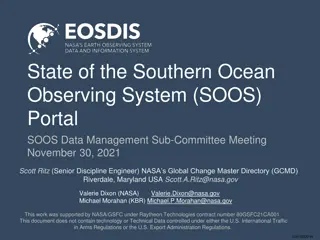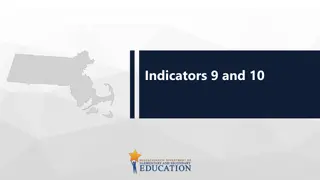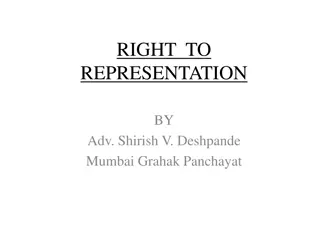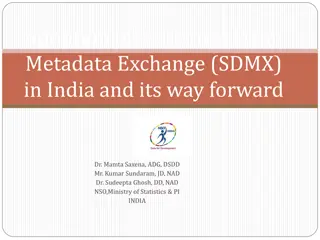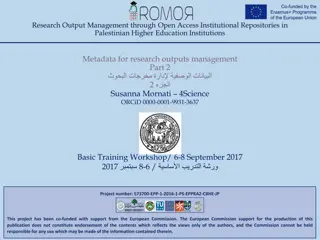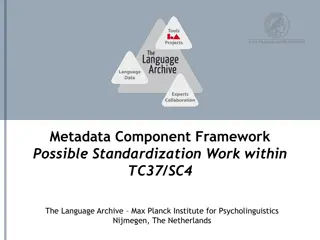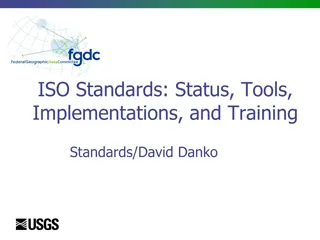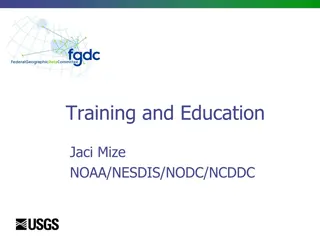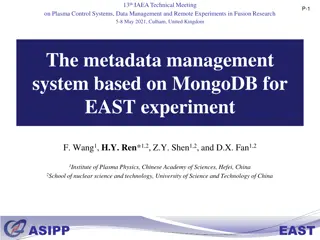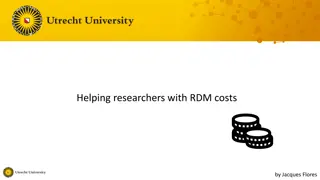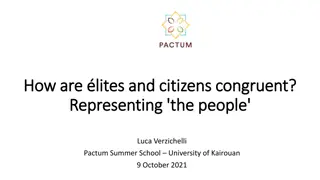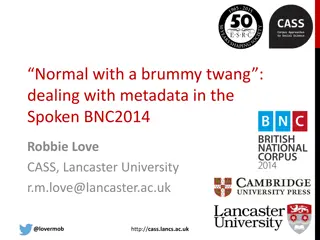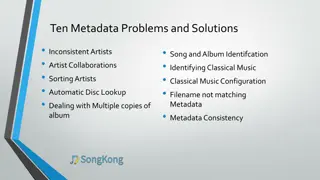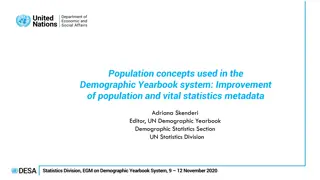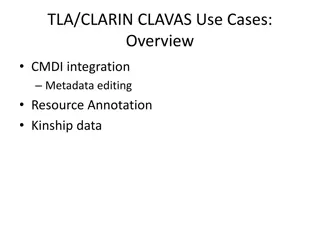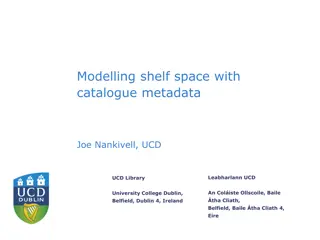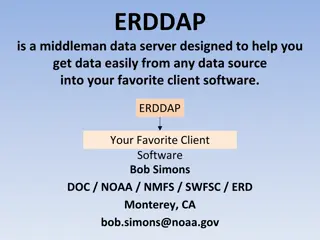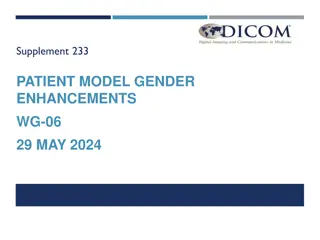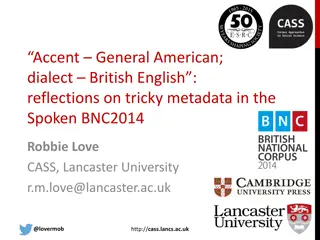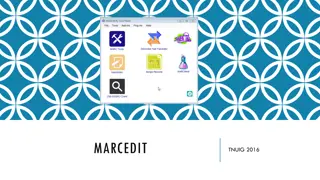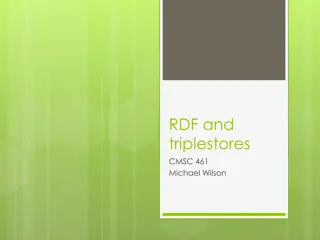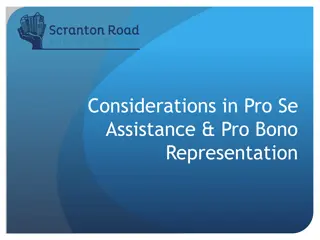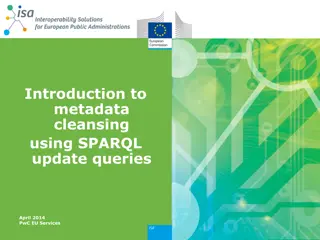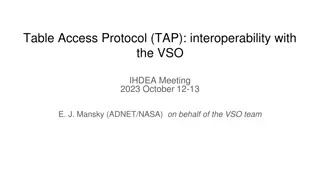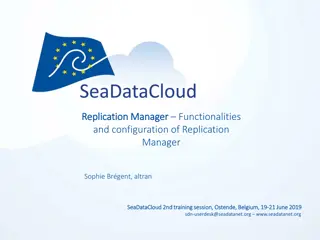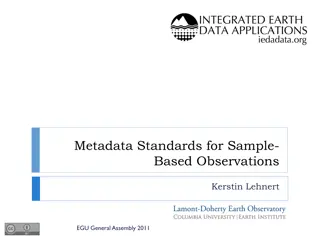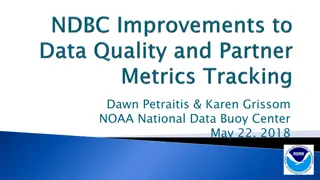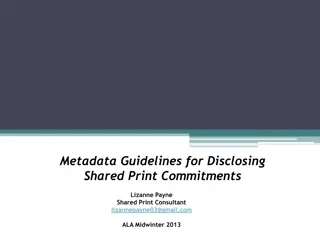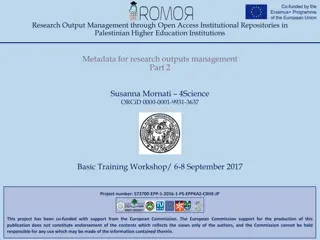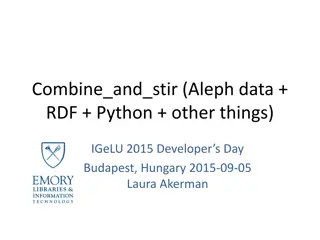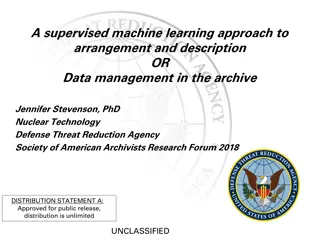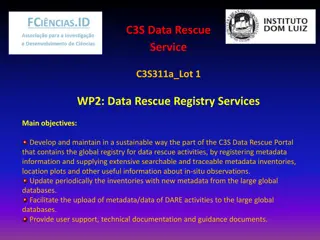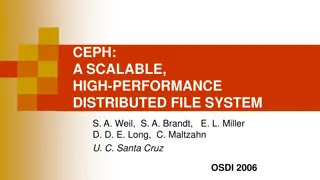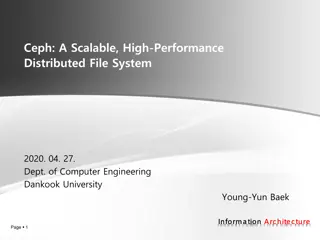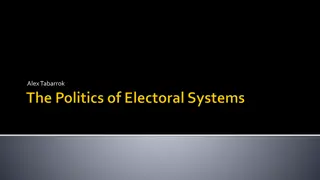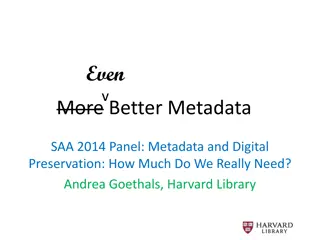Academic Representation at Royal Holloway University
Academic representation at Royal Holloway University plays a crucial role in enhancing the educational experience for students. The system involves various levels of representation with specific responsibilities to ensure effective communication among students, Course Reps, and academic staff. Recen
3 views • 28 slides
Insights on State of the Southern Ocean Observing System (SOOS) Portal Data Management
Delve into the recent discussions and updates from the Southern Ocean Observing System (SOOS) Portal Data Management Sub-Committee Meeting attended by Scott Ritz, Valerie Dixon, and Michael Morahan. Explore the challenges related to metadata documents, portal usage, and GCMD keyword status as highli
0 views • 13 slides
Analysis of Indicators 9 & 10 in Special Education Representation
The indicators 9 and 10 focus on the disproportionate representation of racial and ethnic groups in special education programs. Specifically, Indicator 9 looks at the overall disproportionate representation of groups eligible for special education, while Indicator 10 examines the disproportions with
1 views • 8 slides
Understanding the Right to Representation in Consumer Protection
The Right to Representation in consumer rights allows consumers to be heard and ensures their interests are considered in various forums. In India, the Consumer Protection Act of 1986 recognized this right and established Consumer Protection Councils at different levels. These councils play a crucia
0 views • 13 slides
Adoption of Statistical Data Metadata Exchange (SDMX) in India and Its Way Forward
Data dissemination in India plays a crucial role in making statistics accessible and understandable to the public. The usage of SDMX for exchanging statistical data metadata aims to enhance comparability and interpretation, enabling collaboration with major data agencies. Challenges lie in extending
0 views • 9 slides
Research Output Management in Higher Education: Metadata and FAIR Principles
Research in higher education focuses on metadata and FAIR principles for effective research output management. The content discusses the challenges related to metadata standardization and the importance of data findability, accessibility, interoperability, and reusability in scientific data manageme
0 views • 22 slides
Standardization Process for Metadata Components in Language Archives
The standardization process for metadata components within TC37/SC4 at the Language Archive Max Planck Institute involves analyzing existing metadata sets, seeking input from the CLARIN EU community, and determining the next steps for standardization. The process includes forming submission groups,
0 views • 23 slides
Comparison of Metadata Standards: FGDC, ISO, and NAP
Explore the differences and commonalities between the Federal Geographic Data Committee (FGDC), International Organization for Standardization (ISO), and North American Profile (NAP) metadata standards. Discover the evolution, mandatory elements, code lists, and focus areas in these standards to bet
0 views • 14 slides
Comprehensive Training and Education Resources for Metadata Standards
Explore a wealth of training resources including workshops, guidance documents, ISO workbooks, and online lessons related to metadata standards. Access tools, best practices, and guidance for transitioning to international metadata standards like ISO. Learn from presentations, modules, and other tra
0 views • 9 slides
Metadata Management System for Fusion Research Experiment Data
The metadata management system based on MongoDB for the EAST experiment addresses the challenges posed by the increasing size and complexity of experimental data. With a focus on resource organization and user accessibility, this system streamlines data management, enabling quick insights into the v
0 views • 15 slides
Supporting Researchers with Research Data Management (RDM) Costs by Jacques Flores
Helping researchers meet funder and institutional demands for data management plans, sharing data, metadata, security, privacy, and long-term preservation. Creating awareness about RDM costs beyond storage solutions, emphasizing metadata, informed consent, anonymization, and data preparation. Provid
1 views • 15 slides
Understanding the Congruence between Elites and Citizens in Representation
The relationship between elites and citizens in representative democracy is explored, tracing historical antecedents, the marriage between representation and democracy, modern representation models, and the roles of representatives. Key themes include responsiveness, responsibility, formalistic, des
0 views • 9 slides
Understanding Standard Metadata, Counters, and Meters in P4 Programmable Data Planes
Learn about the role of metadata in packet processing, the significance of intrinsic metadata, and how to utilize custom headers for monitoring switch queues in P4 programmable data planes. This tutorial explores the V1 Model standard metadata and provides hands-on experience in defining and using c
0 views • 21 slides
Dealing with Metadata in the Spoken BNC2014: An Insightful Study
Delving into the metadata of the Spoken BNC2014, this study by Robbie Love at Lancaster University focuses on regional categorization, socio-economic status, and advancements towards dual compatibility with the BNC1994. With over 800 hours of recordings and nearly 700 unique speakers contributing to
0 views • 39 slides
Metadata Challenges and Solutions in Music Management
Addressing ten metadata issues in music organization, such as inconsistent artist attributions and sorting discrepancies, with corresponding solutions including entity-based approaches and artist collaboration management. Strategies for improving metadata consistency and optimizing music data retrie
0 views • 30 slides
Improvement of Population and Vital Statistics Metadata in the Demographic Yearbook System
The Demographic Yearbook system focuses on enhancing population and vital statistics metadata to ensure accurate and concise reflection of population concepts across 230+ countries. It involves annual collection of official national population estimates, vital statistics, and UN international travel
0 views • 16 slides
Integrating CMDI for Metadata Editing and Kinship Data Annotation
Explore the integration of CMDI for metadata editing in resources, including open/closed vocabularies, Arbil interface for vocabulary management, ELAN for resource annotation, and KinOath for kinship data. Discover how CMDI improves data annotation and vocabularies management in linguistic research.
0 views • 10 slides
Exploring Shelf Space Management Through Metadata Analysis
Delve into a novel approach of utilizing metadata such as number of pages, binding type, and year of publication to study shelf occupancy in libraries. The project focuses on addressing the challenge of accurately measuring shelf space taken up by library stock, proposing a data-driven model for bet
0 views • 13 slides
ERDDAP - Facilitating Data Access and Download into Your Favorite Client Software
ERDDAP acts as a middleman data server that simplifies the process of finding, accessing, and downloading data from various sources into preferred client software by addressing common challenges such as diverse data formats, search systems, and metadata availability. Its capabilities include improvi
0 views • 16 slides
Enhancements in Gender Identity Representation in Healthcare
This content discusses the updates and additions to DICOM attributes and CID code lists related to patient gender identity representation. It addresses the use of sex and gender identity data in healthcare settings, focusing on cases like transgender patients undergoing hormone transition. The HL7 G
0 views • 12 slides
Insights into Tricky Metadata in Spoken BNC2014
Reflections on the challenges of metadata in the Spoken BNC2014 corpus compiled by Lancaster University and Cambridge University Press. The project involves collecting and transcribing recordings from a diverse set of speakers, documenting key demographic information, accent/dialect variations, and
0 views • 40 slides
MarcEdit - Comprehensive Metadata Management Tool
MarcEdit is a versatile metadata management tool created by Terry Reese in 1999. Originally designed for MARC records, it has evolved to support various types of data. Key features include MARC editing tools, RDA helper, regular expressions support, task management, and more. Its robust functionalit
0 views • 16 slides
Understanding Metadata and RDF in Data Management
Explore the significance of metadata in data management, the use of RDF and triple stores in organizing data, different reasoning methods available, and the importance of metadata structures. Learn how schemas in RDF allow for easy integration of diverse data types without requiring database reorgan
0 views • 18 slides
Understanding Pro Se Assistance and Pro Bono Representation
This material delves into the considerations, course outlines, justifications, and constitutional basis for assisting pro se litigants and encouraging pro bono representation. It covers the need for self-representation, limitations to the right, the increase in pro se litigants, and the constitution
0 views • 51 slides
Metadata Cleansing Using SPARQL Update Queries
Learn how to transform and cleanse RDF metadata using SPARQL Update queries to conform to the ADMS-AP for Joinup. This tutorial provides essential knowledge on converting metadata for interoperability solutions and the main queries involved. Discover how to ensure your metadata is compliant and read
0 views • 37 slides
Integration of REST/TAP Services into VSO Metadata DB Table
Current status of REST/TAP code implementation in the VSO along with the integration details of REST/TAP services into the VSO metadata DB table. The post discusses the interoperability with VSO IHDEA meeting, production status, available services, and the Apache session ID for distinguishing querie
0 views • 12 slides
Introduction to Replication Manager in SeaDataCloud2nd Training Session
Replication Manager (RM) is a new software replacing Download Manager in SeaDataNet infrastructure. It manages communications between Data Centres, MARIS CDI Import Manager, and EUDAT Data Cloud. RM handles metadata submission, data provision, and workflow management for metadata and data in SeaData
0 views • 31 slides
Metadata Standards for Sample-Based Observations
Exploring the importance of metadata standards for sample-based observations, this comprehensive guide covers various aspects such as soil sampling, legacy repositories, policies, and best practices. Learn about the role of metadata in discovering, accessing, and preserving samples for long-term sha
0 views • 28 slides
Enhancing Data Quality: NDBC's Improvement Project
NDBC is undertaking a project to overhaul its quality control processes, algorithms, and station setups to align with technological advancements and support increased observations. The project aims to produce, disseminate, and archive high-quality observations, improve consistency and transparency,
0 views • 12 slides
Metadata Guidelines for Disclosing Shared Print Commitments
Shared Print Metadata Guidelines aim to establish new Shared Print Institution Symbols and add them to bibliographic records for resource sharing. These guidelines involve creating MARC Local Holdings Records (LHRs) to document archiving commitments for journals. The Shared Print initiative supports
1 views • 12 slides
Research Output Management in PS Higher Education: FAIR Metadata Principles
Research output management in higher education focuses on making scholarly output findable, accessible, interoperable, and reusable through the implementation of FAIR metadata principles. The digital ecosystem surrounding scholarly publications faces barriers like fragmented repositories, varied app
0 views • 22 slides
Linked Data for Enhanced Library Metadata Support
Explore the innovative use of linked data to enrich library metadata and elevate support for student and faculty research initiatives. Learn about Emory University's linked data projects, small-scale use cases, and the integration of campus information systems for seamless access to interconnected r
0 views • 22 slides
Supervised Machine Learning for Data Management in Archives
In this study by Jennifer Stevenson, a supervised machine learning approach is proposed for arrangement and description in archives, specifically focusing on the DTRIAC collection which contains a vast amount of historical documents related to nuclear technology. The aim is to expedite the catalogin
1 views • 15 slides
Sustainable Development of C3S Data Rescue Portal
Develop and maintain the C3S Data Rescue Portal with a global registry for data rescue activities, focusing on registering metadata, providing searchable inventories, and supporting DARE activities. The project aims to update inventories, facilitate data uploads, and offer user support and technical
0 views • 20 slides
Overview of Ceph Distributed File System
Ceph is a scalable, high-performance distributed file system designed for excellent performance, reliability, and scalability in very large systems. It employs innovative strategies like distributed dynamic metadata management, pseudo-random data distribution, and decoupling data and metadata tasks
0 views • 42 slides
Overview of Ceph: A Scalable Distributed File System
Ceph is a high-performance distributed file system known for its excellent performance, reliability, and scalability. It decouples metadata and data operations, leverages OSD intelligence for complexity distribution, and utilizes adaptive metadata cluster architecture. Ceph ensures the separation of
0 views • 23 slides
Electoral Systems and Minority Representation
Various electoral systems, including district and at-large voting, impact how minorities are represented in government. District systems can provide more proportional representation for minorities if they are geographically concentrated, while at-large systems often result in minority under-represen
0 views • 14 slides
Understanding Electoral Formulas and Proportional Representation
Electoral formulas play a crucial role in translating individual votes into legislative seats, with systems like Proportional Representation and Winner-Takes-All affecting government structure and representation. Proportional systems aim for fair seat allocation based on vote share, while non-propor
0 views • 13 slides
Universal Design for Learning (UDL) and Multiple Means of Representation
Explore the concepts of Universal Design for Learning (UDL) and Multiple Means of Representation in education. Learn about the importance of representation in learning, how to apply multiple means of representation, and practical strategies to enhance learning inclusivity. Engage in discussions and
0 views • 34 slides
Evaluating Metadata Quality for Digital Preservation at Harvard Library
Explore the importance of metadata quality in digital preservation with insights from Harvard Library's experience managing their Digital Repository Service. Discover challenges faced with user-contributed metadata and the necessity for systematic validation and tracking to ensure accurate preservat
0 views • 17 slides

